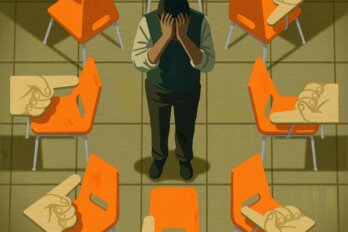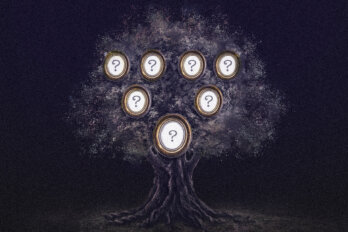On a November night in 2022, I rode a very long escalator up to a movie theatre in Toronto. Always on the lookout for metaphors, I thought the elevator provided a lovely one: it was long and very slow, much like the progress of women’s equality in this world. But it was still going somewhere.
Listening, talking, silence, shame. These were all themes of the film we were about to see, She Said. It hadn’t even hit theatres yet, but every woman in the audience was familiar with the story it would tell: the explosive investigation by New York Times reporters Jodi Kantor and Megan Twohey into the reign of assault and terror conducted by Hollywood film producer Harvey Weinstein. Like a kick to a chessboard, the #MeToo movement that followed upended the polite game of complicity.
Our host for the evening, a trim woman with short hair, came out and picked up the microphone. She wore a yellow T-shirt with the words “Can’t Buy My Silence” written in black. This was Julie Macfarlane, formerly a law professor at the University of Windsor, a survivor of sexual violence, and the co-founder of a campaign to ban non-disclosure agreements—legal contracts that effectively put tape over the mouths of people who have suffered abuse. NDAs were central to Weinstein’s ability to continue his campaign of harassment, and they’re being used to silence victims to this day.
“There’s no point bringing people into the light to talk about sexual harassment and other misconduct,” Macfarlane said, “if we then tell them they can never talk about it again.”
It took me back to October 5, 2017. The Globe and Mail had recently moved to new digs. I was sitting in the handsome hipster coffee shop downstairs, wondering what I was going to put in my column that week, when the news broke. The New York Times story arrived with a gentle ping that held no hint of the cacophony that would follow. “Harvey Weinstein Paid Off Sexual Harassment Accusers for Decades.”
I knew as soon as I started reading that Kantor and Twohey had the goods. This was explosive. The reporters had uncovered nearly three decades of allegations of “harassment and unwanted physical contact” by Weinstein. Crucially, dozens of people at his film company said they’d known about the allegations. As Kantor and Twohey wrote, “Only a handful said they ever confronted him.” One brave employee, Lauren O’Connor, had written to executives at the Weinstein Company to say: “There is a toxic environment for women at this company.” Nothing was done to restrain the predator at the top, let alone to report him.
I read every word of the story, barely breathing. Once I’d finished, I emailed my editor. Holy shit, this is big. Maybe I should scrap my column for this week and write about Weinstein instead?
I had no idea that the stories would keep coming—and coming, and coming. The media, finance, Silicon Valley, the restaurant industry all had their own #MeToo movements. Looking back at the stories, I marvel at the outpouring of rage and pain. It was like some new law of physics: injustice times secrecy times power imbalance equals one impressive shitstorm.
The years since have produced as many questions as answers: What were the secrets that the movement exposed? Who was left out? Who was harmed, and who was rehabilitated? Who got caught in the backlash? How far do we still have to go? What are the mechanisms of change, and who gets to operate those levers? And, finally, a question that torments an individual soul when the world wants to put a hand over her mouth: What is the cost of speaking up?
Most of the world learned about NDAs during #MeToo—particularly the way Weinstein’s legal team used them to smother the truth. Zelda Perkins, one of Weinstein’s assistants at Miramax, was silenced under one of those NDAs. In the 1990s, she tried to report his attempted assault on her assistant, Rowena Chiu, to her superiors. The complaints went nowhere, and Perkins and Chiu were persuaded to sign a settlement that included an NDA.
At that cinema in Toronto, I watched Samantha Morton play Perkins. “I had to have their permission if I wanted to contact a therapist, or to speak to an accountant,” Morton-as-Perkins said. “This is bigger than Weinstein. This is about the system protecting abusers.”
After the film ended and the applause died down, Macfarlane stood up in front of the audience. In September 2021, she had connected with Perkins over Twitter. Together they founded Can’t Buy My Silence, a worldwide organization devoted to banning the use of NDAs in settlements involving sexual assault and harassment.
Macfarlane explained to the audience why she had left her former employer, the University of Windsor, “in disgust.” Macfarlane had been an advocate for students on campus who’d also been victims of sexual violence and abuse. One particular fellow professor was identified as a harasser and eventually let go—but his departure was covered by an NDA. When Macfarlane was asked by other universities about his reputation, she told them what she thought about her former colleague. The other professor then sued her for defamation, and instead of providing documents that would have supported her, the university “threw me under the bus,” she said. So she quit.
“The other thing that connected Zelda and I in our own experiences of NDAs was that we were relatively privileged,” Macfarlane continued. “She was very young, but she was a white woman, she had some means of taking care of herself. I was a university professor. Yet we still got completely screwed. If we were completely screwed, how much worse is that for all the other people with none of the advantages we might have?”
A few months later, I caught up with Macfarlane while she was on a trip to Australia. She was in her sixties and a cancer survivor, but somehow, her injustice motor just kept running. In less than eighteen months, the Can’t Buy My Silence campaign had won a series of astonishing victories. One of those victories meant that NDAs covering sexual misconduct at universities, like the one Macfarlane had unintentionally breached, were banned in several jurisdictions, including the UK and Ontario.
“It’s been a bit dizzying at the moment, but it’s great,” she said. Just a week before, the Canadian Bar Association had adopted a motion to rein in the misuse of NDAs and “discourage their use to silence victims and whistleblowers who report experiences of abuse, discrimination and harassment.” It was largely a symbolic move but an important one, and it came soon after legislation to ban NDAs in sexual misconduct cases had passed in Prince Edward Island.
Macfarlane told me that the Hockey Canada scandal had been crucial in moving the dial. In the spring of 2022, a shocking story hit the headlines: a young woman said she had been sexually assaulted by several hockey players, including members of the men’s national junior team, in a hotel room in London, Ontario, in 2018. A police investigation into the incident was dropped but, after a public outcry, later reopened. In February 2024, five former members of the team—four of whom were playing for the National Hockey League—would be charged with sexual assault. The chief of the London police force apologized to the woman for the length of time the investigation had taken.
The young woman reached a settlement for $3.55 million with Hockey Canada but was subject to an NDA that prohibited her from sharing any details. The outrage that followed was seismic. For one thing, Hockey Canada had settled twenty-one sexual assault claims since 1989, some of which were attached to NDAs. For another, the money came from a pot of money with the Orwellian name “National Equity Fund.”
Bowing to public pressure, Hockey Canada released the complainant from her NDA. The shift came not because the organization was ashamed of its players’ alleged assaults, or of how it had handled those allegations, but because doing so had become bad for the brand. “Corporate Canada is not going to agree to stop using NDAs for moral reasons,” Macfarlane told me. “They’re going to stop because using them looks even worse.”
The process of reporting sexual violence is still fraught, Macfarlane pointed out. “It’s still incredibly difficult for people to report. Not only is it personally traumatizing for them but they are also entering into a system—whether that is in a workplace, civil courts, or the criminal system—which treats allegations around sexual violence completely differently than anything else. You still have these issues of so-called credibility and how much you have to be able to show in evidence about something which, of course, is virtually always not witnessed by anybody else.”
Was it worth it? It was for her. But knowing what it took out of her, she could not make that decision for anyone else.
Excerpted from What She Said: Conversations about Equality by Elizabeth Renzetti. Copyright © 2024 Elizabeth Renzetti. Published by McClelland & Stewart, a division of Penguin Random House Canada Limited. Reproduced by arrangement with the publisher. All rights reserved.





